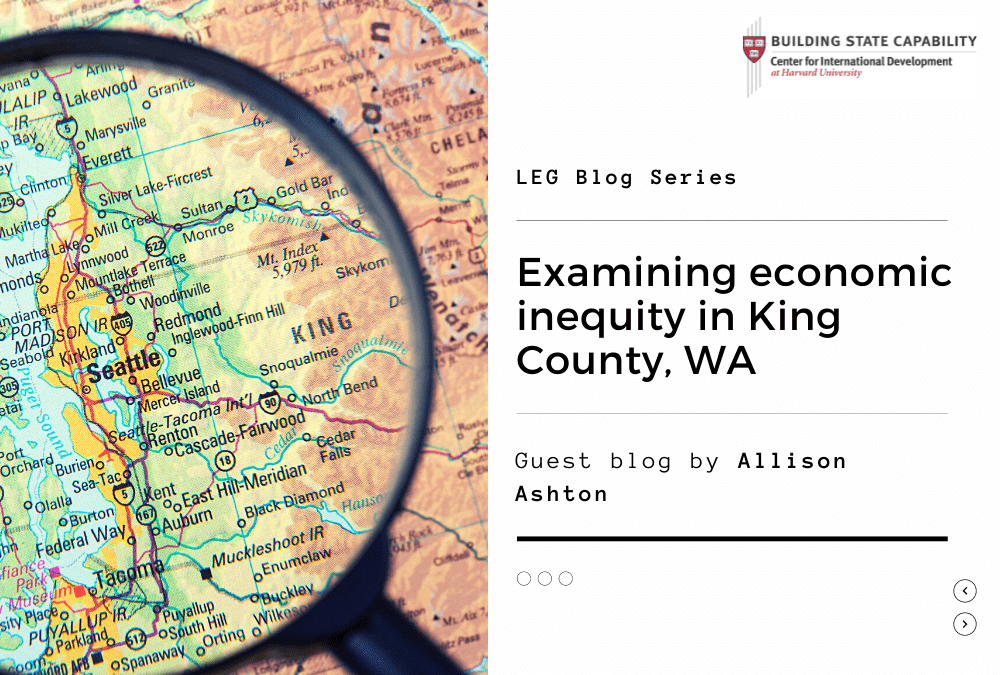Guest blog by Allison Ashton
Growth challenge: My growth challenge is regional economic inequity. The reason it matters is because BIPOC communities, women, and workers with lower levels of educational attainment in King County are experiencing increasing barriers to opportunity that inhibit their success and potential to contribute to and benefit from our tremendous regional economic success.
Country/region/municipality: King County, WA, USA
King County, Washington, is currently experiencing simultaneous crises in public health, the economy, and social justice. The ripple effects of these crises are likely to last many years into the future and change our society forever. While challenging, these crises are giving us once-in-a-century opportunities to build back better and avoid the mistakes we’ve made coming out of previous recessions, which have exacerbated inequities.
One of the biggest challenges that King County faces is a lack of economic development tools that other states and localities have at their disposal. The State Constitution prohibits the gift of public funds, which limits the amount of assistance we can offer our businesses. This means we have to be even more creative and resourceful to assist our most vulnerable businesses.
King County ranks as one of the wealthiest the country. However, wealth and security are not equally distributed. To compound these inequities, the COVID pandemic and resulting fallout have disproportionately affected Black, Indigenous, and People of Color (BIPOC) communities, women, and workers with lower levels of educational attainment in King County (see chart below). Economic recovery will be slower in these communities, and a dedicated, cross-sector effort will be needed to ensure they survive and thrive. I care deeply about this problem because I am a King County resident, and I want to see improvements in our regional inequity. It means a great deal for my fellow residents to share in the immense prosperity that has been generated.
My region’s growth problem looks more like an 1804 journey than a 2015 journey. Therefore, the problem would be characterized as complex. King County helped lead three important cross-sector system transformations before the pandemic: 1) the reimagination of the local workforce development board with blended funding, 2) the birth of the region’s first multi-county public-private economic development partnership, Greater Seattle Partners, and 3) the prioritization and fortification of the regional creative economy. Each of these bodies of work represent complex systems that are based on relationships, networks, and patterns of behavior, which will require ongoing reflection and collaboration to continue.
I believe my growth journey requires a problem-driven iterative adaptation (PDIA) approach. This is because my problem involves various and diverse stakeholders and agents, each with their own personality and biases, and will require gradual and iterative changes. Part of my role as economic recovery director is to help people to see the overall structures, patterns and cycles in systems, rather than seeing only specific events or elements.
I believe my region has sufficient diversity of knowhow to grow. King County and key partners in our region have built strong experience placing communities in greater need in the center of our work and, even further, placing impacted communities in the lead. While significant, to date those successful efforts have focused on particular initiatives or geographic areas of the county. We believe that we and our communities in greatest need have enough experience working together that we can extend our efforts to more broad-based work as will be necessary for an equitable economic recovery and upward mobility.
Below are some key ideas/learnings that I will take away from this course:
- Framing a problem in a way that will get attention and catalyze action is critical.
- A multidisciplinary team, combined with an influential network, is more effective and efficient at solving a growth problem than just one person.
- To make significant change over time, you must deconstruct the problem and balance functionality and legitimacy while making small, iterative, incremental, positive shifts.
This is a blog series written by the alumni of the Leading Economic Growth Executive Education Program at the Harvard Kennedy School. 65 Participants successfully completed this 10-week online course in May 2021. These are their learning journey stories.
